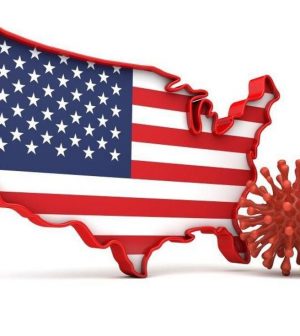- 10 Strategies to Overcome Insomnia
- Could Artificial Sweeteners Be Aging the Brain Faster?
- Techniques for Soothing Your Nervous System
- Does the Water in Your House Smell Funny? Here’s Why
- Can a Daily Dose of Apple Cider Vinegar Actually Aid Weight Loss?
- 6 Health Beverages That Can Actually Spike Your Blood Sugar
- Treatment Options for Social Anxiety Disorder
- Understanding the Connection Between Anxiety and Depression
- How Daily Prunes Can Influence Cholesterol and Inflammation
- When to Take B12 for Better Absorption and Energy
U.S. COVID Cases Fell 60% Since September, But Vigilance Still Needed: Health Officials

Coronavirus cases have plunged by 60% since mid-September’s Delta-driven peak, U.S. health officials said earlier this week. But with winter on the way, they warned that Americans still need to protect themselves and others against COVID-19.
“We are now heading in the right direction … but with cases still high, we must remain vigilant heading into the colder, drier winter months,” Dr. Rochelle Walensky, director of the U.S. Centers for Disease Control and Prevention, said in a White House coronavirus briefing, CNN reported.
Along with the arrival of winter, there’s still a relatively high number of cases and many children remain ineligible for vaccination.
Over the last week, new cases averaged 69,011 a day, compared to 127,531 a day in mid-September, Johns Hopkins University data show, CNN reported.
The all-time peak was in mid-January, with more than 251,800 new cases a day.
There were 51,541 COVID-19 patients in U.S. hospitals as of Wednesday, a 50.4% decrease from September, according to the U.S. Department of Health and Human Services, CNN reported.
As of Wednesday, COVID-19 deaths over the past week averaged 1,369 a day, compared with 2,092 on Sept. 22, the Hopkins data showed.
Some experts have been cautious about whether the United States has seen the worst of the pandemic.
“We saw this happen in June over the summer, when we declared the pandemic to be over a bit too early,” Dr. Richina Bicette-McCain, associate medical director at Baylor College of Medicine in Houston, told CNN.
“We decided that those who are vaccinated need not wear masks, which turned into everyone not wearing masks, and then subsequently the spike and the Delta wave followed,” she added.
More information
Visit the U.S. Centers for Disease Control and Prevention for more on COVID-19.
SOURCE: CNN
Source: HealthDay
Copyright © 2026 HealthDay. All rights reserved.










